
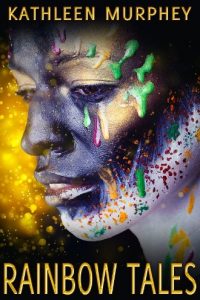
Rainbow Tales by Kathleen Murphey
Review by Rosalind Kaplan
This time there really is something new under the summer sun. Rainbow Tales by Kathleen Murphy is a collection of stories based on traditional fairy tales and folklore, but each with a refreshing and surprising twist. Rather than suffer derision and isolation for their diversity, gender roles, gender identity, and sexual orientation, characters of old folk tales are flipped on their heads and rewarded for authenticity, happiness, community, and family.
The book begins with a story entitled ‘Beau and the Beast’. A prince, very handsome but lacking kindness and humility, is transformed into a hideous beast by a fairy queen. He is saved by the compassion of an old woman. In his beastly form, he can experience her inner beauty, and it assuages his loneliness. He then befriends the hag’s(the old woman’s) grandson, Beau, and the friendship deepens into romantic love and sexual attraction as the grandson, in turn, is able to see the beast’s inner beauty. Beau’s love restores the prince to his human form but with new compassion. The couple is accepted by the older woman, the king, and the ‘queen’ and live happily ever after.
Throughout this, and other stories in Rainbow Tales, we encounter well-rendered, complex characters, including a transgender prince in love with a frog, a non-binary P. Pan, whose quest is to help marginalized, neglected, and abused children, and a Snow White who falls in love with Sleeping Beauty when the latter’s family offers her shelter as she flees execution by a jealous queen.
The overall effect of the collection of stories is refreshing and hopeful, as the stories upend not only the obvious sexist, racist, and homophobic tropes of standard fairy tales but also call attention to the more subtle disparities these old tales espouse. In Murphey’s long-ago-far-away world, stepmothers are often kind. A prince or princess might choose to assist the servants in the kitchen. Magic mirrors are used to help those in need, fairies have private lives, and royalty has a broad range of skin tones.
These newly crafted fairy and folk tales open up the genre at a crucial time in history, a time when we can no longer overlook the harmful stereotypes and biases of many classic tales. These revised versions bring new relevance to old lore while continuing to capture the charm and magic of the fairy world.
Rainbow Tales is not a collection aimed at children, however. Known as a sex-positive author, Murphey includes descriptions of sexual encounters and sex acts in her narratives, rendering Rainbow Tales a book for mature audiences. While the explicit nature of these passages is not necessary to the storylines themselves, the depiction of inclusive, physical intimacy may be psychologically helpful and even life-saving for some readers. The transformation of classic fairy tales and folklore to reflect modern values is not a new concept in itself. In fact, many stories have evolved throughout the centuries; intercultural elements have been added, and feminist perspectives have emerged (think of the powerful female protagonist Elsa in Frozen). With thousands of traditional international fold tales out there, this collection is a welcome addition, set apart by the breadth of diversity depicted as well as its sex-positivity.
Kathleen Murphey teaches composition and literature courses in the English and Humanities Departments at Community College of Philadelphia. She has a Ph.D. in American Civilization from the University of Pennsylvania. She has presented conference papers on the masculinization of female sexuality in popular culture. Examples include “The Porning of High Medieval Fantasy: George R.R. Martin’s A Song of Ice and Fire Series” and “Fifty Shades of Creep: Yet Another Masculinization of Female Sexuality.” Recently, she has started creating fiction (poetry and fiction) trying to give voice to more empowered visions of female and diverse sexualities. Some of her poems have been published through The Voices Project and Writing in a Woman’s Voice. She has three collections of alternative fairy tales, Other Tales and Rainbow Tales (published by JMS Books). Beyond the Witch is an evolving collection of unpublished fairy tales. She is married and has three lovely daughters who are becoming young women right before her eyes.

Rosalind Kaplan (left) has been published in several literary and medical journals, including Across the Margin, Brandeis Magazine, Eastern Iowa Review, El Portal, Galway Review, Green Hills Literary Lantern, Signal Mountain Review, The Smart Set, Stonecoast Review, Sweet Tree, and Vagabond City. Her memoir Still Healing: A Doctor’s Notes on the Magic and Misery of a Life in Medicine was selected as the winner of the Minerva Rising 2022 memoir contest and is forthcoming in the fall of 2024.

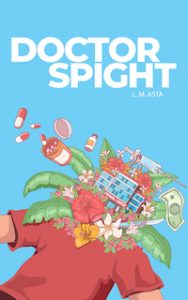


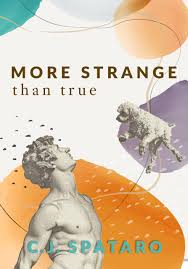
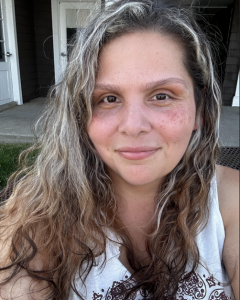
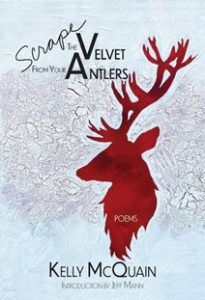

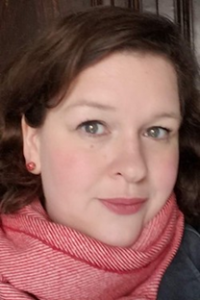
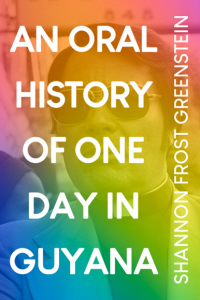


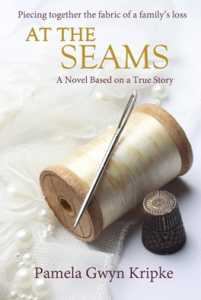

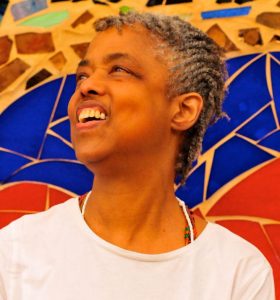
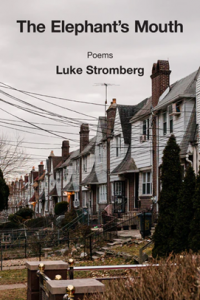
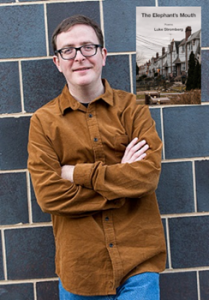
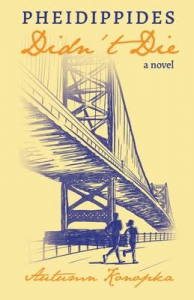


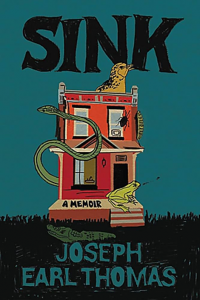

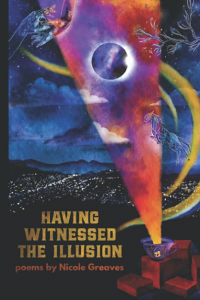
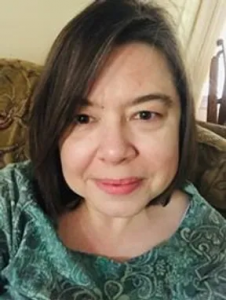 Nicole Greaves’s poetry has appeared in numerous literary reviews––including SWWIM, Cleaver Magazine, Matter Poetry, American Poetry Review; Philly Edition, Radar Poetry––and was awarded prizes by The Academy of American Poets and the Leeway Foundation of Philadelphia. She was a finalist for the 2020 Frontier Digital Chapbook Contest and a 2015 finalist for the Coniston Prize of Radar Poetry, who also nominated her for The Best of the Net. She was selected by Gregory Orr as the 2003 Poet Laureate of Montgomery County, Pennsylvania.
Nicole Greaves’s poetry has appeared in numerous literary reviews––including SWWIM, Cleaver Magazine, Matter Poetry, American Poetry Review; Philly Edition, Radar Poetry––and was awarded prizes by The Academy of American Poets and the Leeway Foundation of Philadelphia. She was a finalist for the 2020 Frontier Digital Chapbook Contest and a 2015 finalist for the Coniston Prize of Radar Poetry, who also nominated her for The Best of the Net. She was selected by Gregory Orr as the 2003 Poet Laureate of Montgomery County, Pennsylvania.